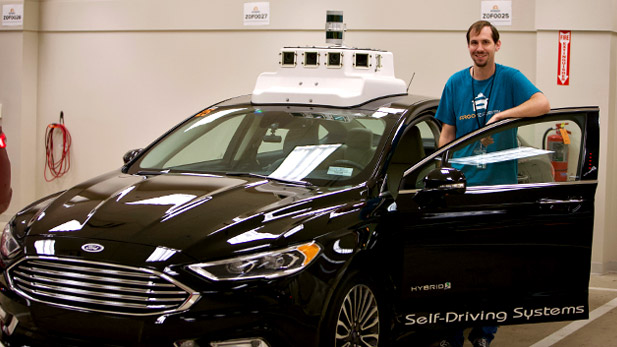Alumnus Helping Bring Autonomous Technology to Every Day Life

Electrical engineering alumnus Dane Bennington is a senior engineer for special projects with Argo AI, a thriving startup based in Pittsburgh that has received $1 billion in backing from Ford Motor Company.
Autonomous cars, connected eyeglasses and robotic maids may have seemed out-of-this-world when “The Jetsons” debuted in the 1960s. But creative aspects of those high-tech gadgets are being designed by electrical engineering alumnus Dane Bennington and other highly motivated engineers, computer programmers and technologists who are pushing the boundaries of artificial intelligence.
Yes, the future is now.
Self-driving cars are racking up miles throughout the country on test tracks and city streets—not only testing out autonomous vehicle technology, but also proving that it can become a viable business.
The stakes are high. Ford Motor Company has invested $1 billion over five years with Argo AI in hopes of launching its first production autonomous vehicles in 2021. Germany’s Volkswagen may be adding another $1 billion into the company’s efforts, according to published reports. Other players include Cruise Automation, backed by General Motors and Honda; Waymo, from Google parent Alphabet Inc.; and several China-supported companies.
“It’s just so rare in life when you can completely change the landscape of transportation,” says Argo AI chief executive officer Bryan Salesky. “We’re going to make this happen.”
Bennington, a senior engineer for special projects, is among the company’s nearly 400 employees who are tackling one of the most challenging applications in computer science, robotics and artificial intelligence—creating fully autonomous vehicles that are able to safely navigate city streets.
The 2011 graduate said in a telephone interview from the startup’s new three-story Pittsburgh headquarters, “These are exciting times to be working on autonomous cars. The algorithms, sensors and computing power required to take a lot of the ideas forward decades ago have arrived such that it's now feasible to run them in real time on mobile platforms. In short, we stand at the edge of an era in which theoretical robotics can become practical.”
Ford felt comfortable enough with Argo AI’s technology that it hosted journalists and industry analysts late last fall in Miami for product demonstrations.
A white crown with a series of cameras, radars and lasers provide the Ford-Argo Fusion autonomous vehicle prototype with a wealth of data that helps the car respond to things around it, including other vehicles, pedestrians, traffic signals, pets and other obstacles. Simultaneous localization and advanced mapping techniques are a key component to the process, and tools developed by Argo AI help the car understand its location to a high degree of accuracy—as well as where it can go, where it can’t and how fast, Bennington explains.
Current research is how Argo AI technology can be incorporated into other areas of people’s lives.
Bennington, who spent more than four years as a robotics engineer with the National Robotics Engineering Center while earning a master’s degree at Carnegie Mellon University, says “As folks continue to come up with new and better approaches to complex problems, the more powerful computing and more discerning sensor are needed. We have approaches that we are fairly certain will get us to an autonomous car, but there are lots of places where major changes in approach may yield enormous benefits. It's a time to throw ideas at the wall and see what sticks, while also having a good system by which to benchmark.”